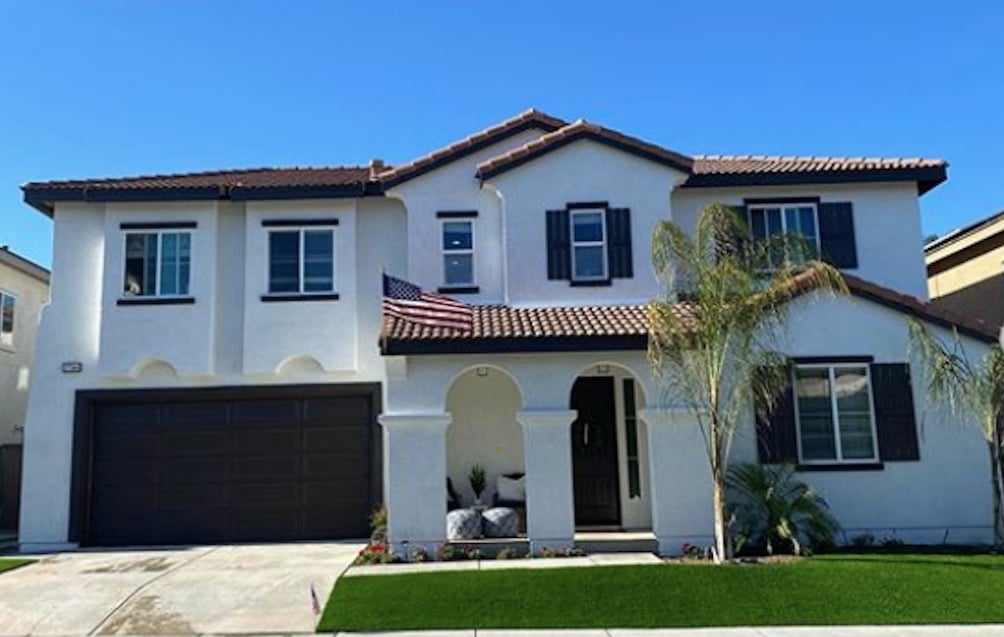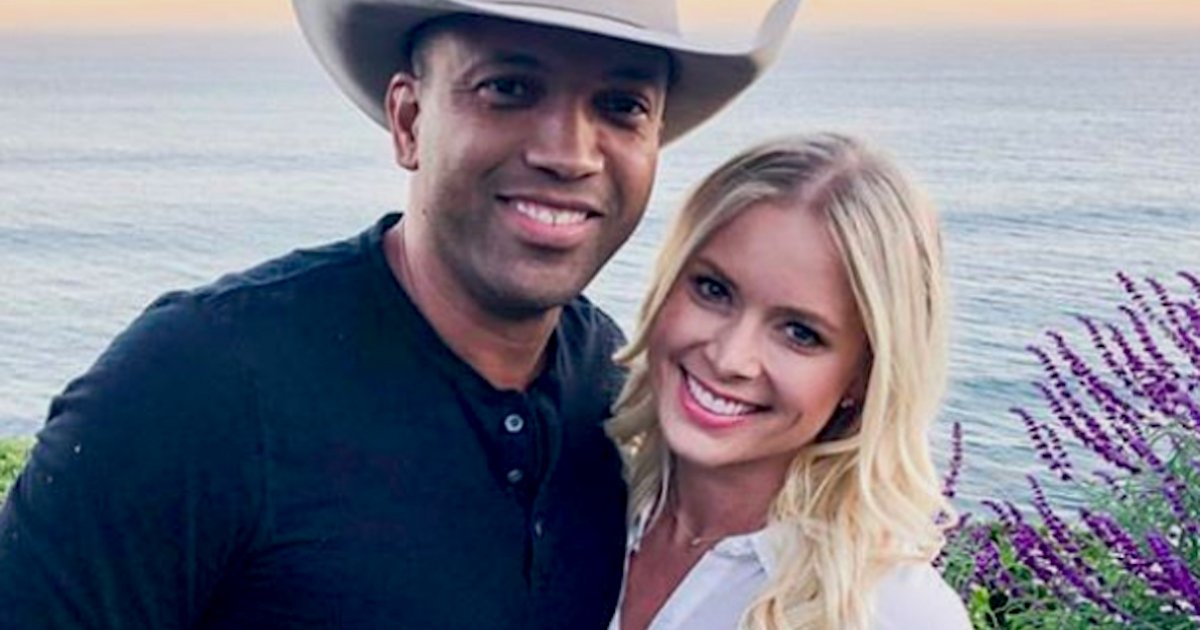Their Cancer Journey
- Criscilla was diagnosed with stage 3 colon cancer in 2018
- After surgery and chemotherapy, she entered remission
- When the cancer returned as stage 4, she was told it was “treatable, not curable”
“He's so loving,” she told SurvivorNet in a recent interview. “He's always thinking ahead. He shows that he loves me to the world. He is as faithful as they come. It's one of those love stories."
Dr. Heather Yeo, Colorectal Surgeon and Surgical Oncologist Weill Cornell Medicine and NewYork-Presbyterian, says colon cancer in younger people is on the rise.
With over 200 virtual guests in tow, she shared the children’s in-home classroom space, then entered the couple’s bedroom and pointed to the framed photo, displayed on her husband’s bedside table, that makes the couple’s cancer journey all the more poignant.
The woman in the photo is Coffey Anderson’s mother, who died of cancer when he was 10 years old.

The family moved into this house before the pandemic hit. “I've turned our home into our happy place. My zen. My safe place for my babies.”
“We had been trying to figure out what was wrong with my mother for over a month. Doctors, tests, tubes, blood drawn, stay over night, more tubes, whispers, nurses shuffling around us,” the singer shared on Instagram (below) on the November 27th anniversary of her death.
“Then a call came for my dad to go to the hospital. Early in the morning or late at night, I can't remember, I was told that mom had went to the other side.”
His mother’s death was shattering, Anderson said: “I cried for weeks, didn't talk for a month, and had to deal with pain that took my breath and sat in my chest.”
“You Were The Peace I Needed In This Crazy World”
Coffey Anderson was playing music at worship services when he met Criscilla in church in 2008. The couple, who found common ground in their faith, married a year later. As Criscilla explained to SurvivorNet: "His mom died of cancer 10 days before his 11th birthday. And I know this hits close to home for him. And so many times, I ask God 'you took her away, you can't take me away from him, too.'"
As those who lost a parent to cancer know, the loss doesn’t diminish. “It's still there,” Coffey shared on Instagram. “It dulls with each day from the love I receive from others and those close to me. Mom, you were the best. You loved everyone, thought before you spoke, and you were the peace I needed in a crazy world. You are missed EVERYDAY.”
Criscilla Anderson’s Cancer Diagnosis
Anderson first started noticing symptoms in May of 2018. Stomach pains would hit, leaving her doubled-over in pain. "As a mom, you always feel like you don't have the time to deal with things like this," says Anderson, who has three children. "But there came a point when I couldn't ignore it anymore."
“It’s scary for patients when colon cancer returns, says Dr. Heather Yeo, “but it doesn’t mean there aren’t treatment options.”
When the pains worsened, she went to the emergency room and was diagnosed with colitis. But a prescribed antibiotic didn't help. "By that time, I was in excruciating pain.” A colonoscopy revealed a blockage, which landed her in the hospital for emergency surgery.
RELATED VIDEO: Treating a Bowel Obstruction Caused by Colon Cancer
Doctors removed a two-foot length of her colon and diagnosed stage 3 colon cancer. After a brief remission, she was found to have stage 4 metastatic colon cancer: "The cancer has spread throughout my para-aortic region and has begun growing up my back," she said in a teary post on Instagram.
The couple sought alternative treatment in Spain — a treatment approach that SurvivorNet and does not endorse for our readers. But she remains under the care of oncologist, Dr. Marwan G. Fakih at City of Hope’s Duarte, CA campus, and undergoes regular scans and blood work to closely monitor her condition.
“I know that the kind of chemo for my cancer will stop working,” Criscila says of her unconventional approach in our interview. “Your body will become immune to the chemo and it will stop working. So I don't want to exhaust that [option] just yet.”
My Doctor Is Not One to Say: “Don’t Do Chemo”
“He specializes in colon cancer. He knows that I've opted out of the chemo route. He doesn't pass any judgment,” she says of her oncologist. “He’s not one to say, ‘don't do chemo’.” She has not ruled out chemotherapy if her condition changes. “God forbid, it spreads or gets worse, then I'm going to get on the chemotherapy.”
RELATED: Chemotherapy After Colon Cancer Recurs
Anderson follows a scrupulous diet — “no meat, no dairy, no sugar,” she told us and takes, “high-dose vitamin C,” among other supplements, as directed by her doctor in Spain.
In April, Anderson shared that her oncologist noted her tumors were shrinking. "The smallest one of all of them, he couldn't see," she said," so I'll take it. Because I know that God has healed me. And I know the next time I go in for another scan, they're going to be gone. I know this is my miracle. This is so great."
Why Are Young People Getting Colon Cancer?
The American Cancer Society guidelines for colon cancer recommend that average-risk adults begin getting colonoscopies at age 45. For those who are given clear scans, they should go back for additional colonoscopies once every 10 years. With regular screening, colon cancer is preventable.
However, even with these nation-wide screening recommendations, the rate at which younger adults are being diagnosed with colon cancer has been going up. In a previous interview, Dr. Heather Yeo, a colorectal surgeon at Weill Cornell, said that the reason colon cancer is becoming more common among people under 50 is hard to pin down, but these cancers tend to have some unique characteristics.
"We don't know exactly why it's increasing," Dr. Yeo said. "It's a different type of cancer. The colon cancers that are in the younger age group are more likely to be on the left side, they're more likely to be rectal cancers, they are more likely to be kind of aggressive tumor types."
"It may be something environmental. Our group actually tried to look at some of the kind of common risk factors," she explained. "We looked at maps of the United States. We looked at smoking rates, and we looked at obesity. If you compare that to colon cancer, you'll see, yes, where there's obesity in the United States, there's higher colon cancer.”
“However, it didn't quite match with younger age groups,” Dr. Yeo said. “So there are some different risk factors for these early colon cancers."
Colon Cancer: Know The Symptoms
For people under the age of 45 the need to undergo colon cancer screening varies. Some people are considered high-risk and may need to get colonoscopies earlier and more frequently. Another important aspect in the fight against this disease is symptoms. If you're experiencing any of the following symptoms, a conversation with your doctor about screening may be in order:
- Change in bowel habits
- Change in the color of stool
- Abdominal pain
- Unintended weight loss
- Anemia
Learn more about SurvivorNet's rigorous medical review process.


